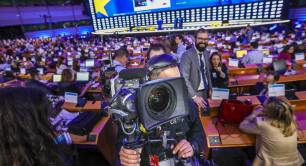Short n Sweet: 10 places social enterprise is 'losing momentum'
Bite-sized stories this week from the impact economy around the world: mixed progress on Europe's social enterprises policies, Omidyar's latest spinout, Malaysian businesses get new accrediation, and Match Trading reaps rewards. Plus, new faces and departures.
Report: Social enterprise movement “losing momentum” in several European countries
16 EU countries have adopted new legislation on social enterprise during the past decade, and 11 have created explicit policies to support its development, according to a new report.
'Social enterprises and their ecosystems in Europe' collates and analyses findings from 35 country reports (EU28 plus Albania, Iceland, Montenegro, North Macedonia, Norway, Serbia and Turkey), compiled in 2019.
It finds that interest in social enterprises among policymakers, public authorities and researchers “has increased remarkably” in most countries since 2014. The number of social enterprises is rising in most EU member states.
In some, however – including Belgium, Croatia, Cyprus, Denmark and Romania – the movement seems to have “lost momentum” after the “lively debates” around initial adoption of new laws and policies. In Croatia, a 2015 strategy was expected to create a more supportive environment, but has not yet been fully implemented; high expectations have also been unmet in Albania, Malta, Cyprus, Poland and Serbia due to delays in the final approval or implementation of new laws or strategies.
The research was coordinated by the EURICSE research centre and the EMES network and funded by the EU’s programme for Employment and Social Innovation (EaSI).
eBay founder spins out investment fund for education
Philanthropic investment firm Omidyar Network has launched the final of six planned spinouts, this time with a focus on “unlocking human potential through learning”.
Founded and funded by Pam and Pierre Omidyar, the founder of eBay, Imaginable Futures begins with $200m of capital invested, and an additional $150m for operations and investment over the next four years.
Imaginable Futures’ hybrid structure – part philanthropic foundation, part impact investor – will allow it to back for-profit entrepreneurs as well as social and public-sector organisations.
Amy Klement, managing partner of Imaginable Futures, said the spinout was a response to the “need to massively rethink not only what people learn but also how and when they learn”. The organisation will “support bold changemakers who are doing exactly that – so that every learner has the opportunity, tools and support that they need to imagine, and to realise, a brighter future”.
Imaginable Futures’ current global portfolio includes more than 100 for-profit companies and nonprofit organisations in the US, Africa and Latin America with a focus on innovating in learning during the early, school and adult years.
Last year, Omidyar spun out Flourish, an evergreen fund investing in innovations for financial inclusion and wellbeing.
First Malaysian social enterprises achieve government certification
A first batch of social enterprises in Malaysia has received official accreditation from the government, according to Digital News Asia.
Twenty-two organisations picked up the ‘basic’ level of the national certification, which aims to give social enterprises a way to communicate their social and environmental impact – and to help them attract talent and win more business.
Research published last year showed that most Malaysian citizens were not familiar with the concept of doing business while doing good, and social entrepreneurs found it “hard to even discuss” the fact that their venture was generating an income.
The accreditation was created by the Ministry of Entrepreneur Development & Cooperatives and a number of partners. The ministry received 202 applications and expects to certify a further 40, Digital News Asia reports.
Accredited enterprises – which must have a clearly-stated social or environmental goal and allocate a ‘significant’ amount of resources to it, and earn at least 50% or more of total revenue – can choose to be listed on a public, vetted directory and will be able to access capacity development programmes and grants.
Match-funding for earned income reaps rewards
New research shows social sector organisations incentivised by a Match Trading grant are increasing their income from trading at 2.5 times the pace of those supported by a traditional grant.
The combined increase in income from trading among 143 voluntary, community and social enterprise organisations in the UK who took part in programmes run by the School for Social Entrepreneurs (SSE), was £5.5m over a one-year period.
Match Trading involves matching an increase in income achieved through trading, pound for pound, and was created by SSE and first piloted in 2015.
The research showed that participants typically increased their income from trading by £17,000 – an uplift of 64% - compared with their income from trading in the previous year. They were incentivised by a Match Trading grant (capped at either £4,000 or £10,000), and a learning programme from SSE. They outperformed a control group of 30 community businesses, who received a traditional grant of £10,000 plus training, and typically increased trading income by 21% compared to the previous year.
New faces and departures: GSG, Hargreaves Foundation, National Lottery Community Fund, H&M...
Cliff Prior, CEO of Big Society Capital, is to head up the Global Steering Group for Impact Investing, replacing outgoing CEO Amit Bhatia. More from us here.
Jon Siddall, director of funding at Guy's and St Thomas' Charity, will join the South West Academic Health Science Network in March as their new CEO.
Alexandra Butler, a former Hargreaves Lansdown employee, has been appointed managing director of the newly-formed Hargreaves Foundation.
Cassie Robinson has been appointed senior head of UK portfolio at the National Lottery Community Fund. Read her reflections on the role here.
H&M named former sustainability head and chief operating officer, Helena Helmersson, as its new (and first female) CEO – a move welcomed by environmental advocates.
Charitable trust Lloyds Bank Foundation for England and Wales appointed three new trustees: Darren Knight, CEO at Bolton CVS; Kamran Mallick, CEO at Disability Rights UK; and Ruth Sutherland, CEO of Samaritans.
Triodos Investment Management has appointed William de Vries as director for impact equities and bonds.
American social entrepreneur Leila Janah died aged 37. She was the founder and CEO of three organisations: Samasource, a global for-profit technology leader in training data for AI; LXMI, a fair-trade, organic skin care company; and Samaschool, a non-profit focused on reskilling for the new economy.
Thanks for reading our stories. As somebody working in the impact economy, you'll know that producing quality work doesn't come free. We rely on paid subscriptions and partnerships to sustain our purpose-led journalism – so if you think it's worth having an independent, specialist media platform to share your news, insight and debate across the globe, please consider subscribing. You'll also be buying social: Pioneers Post is a social enterprise itself, reinvesting all profits to help you do good business, better.



